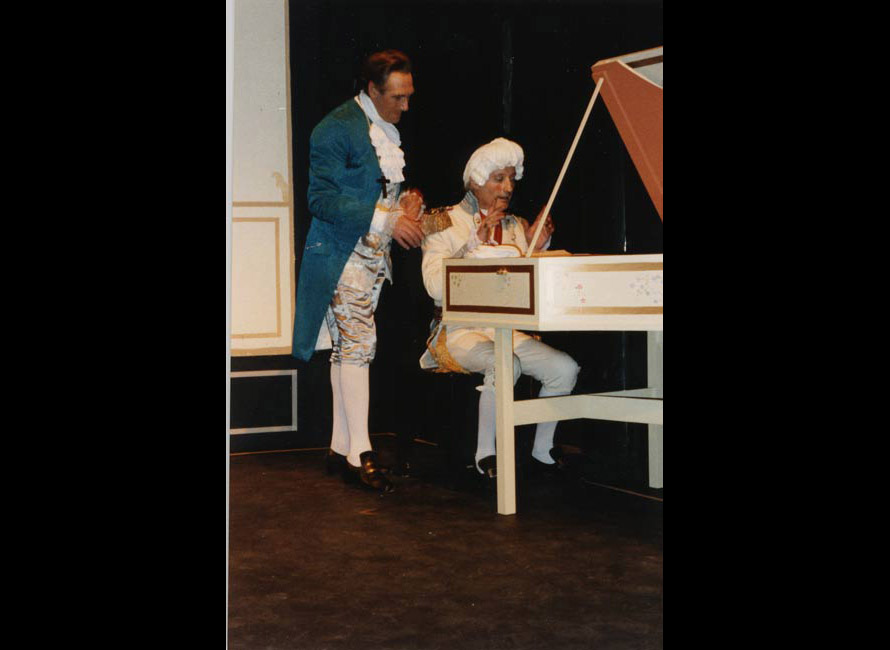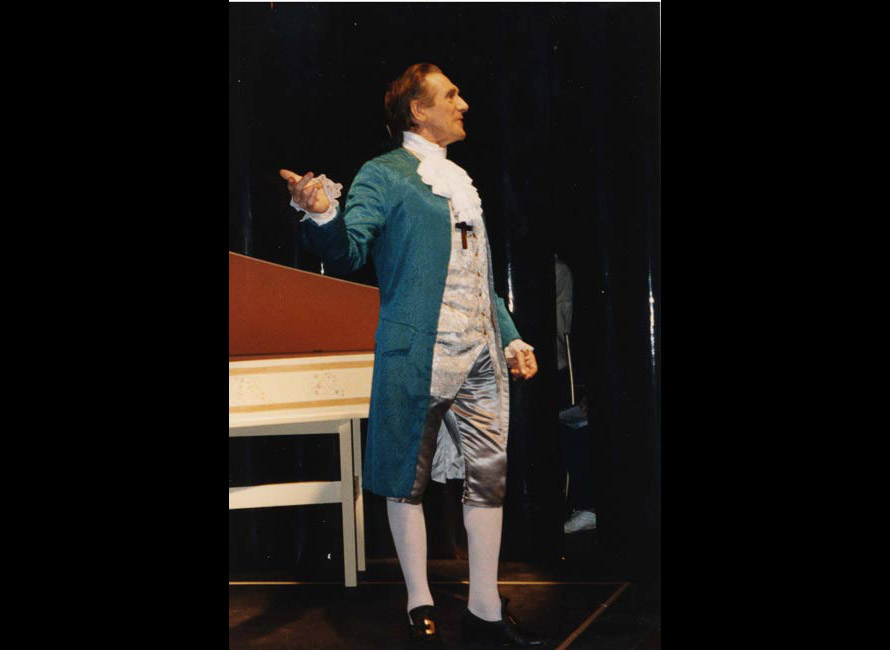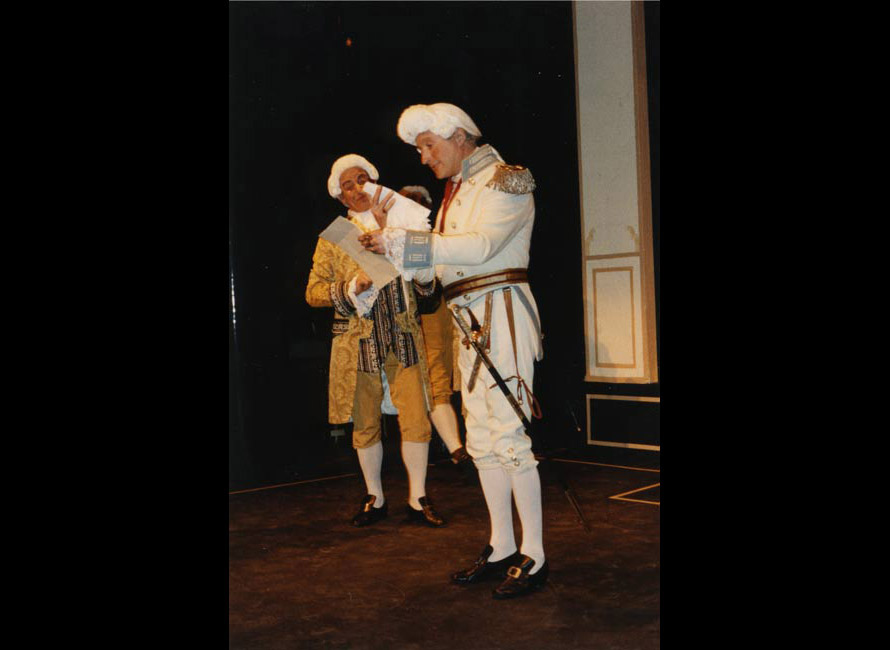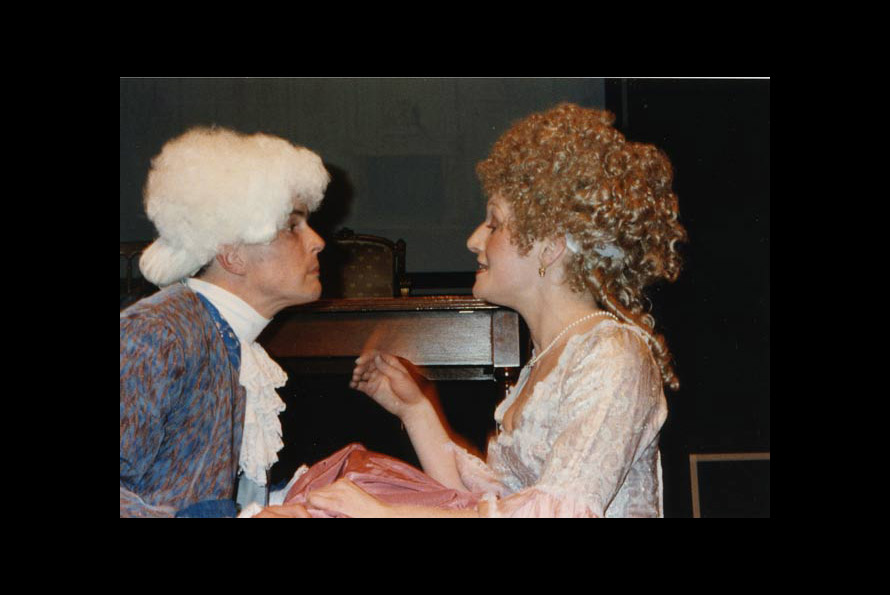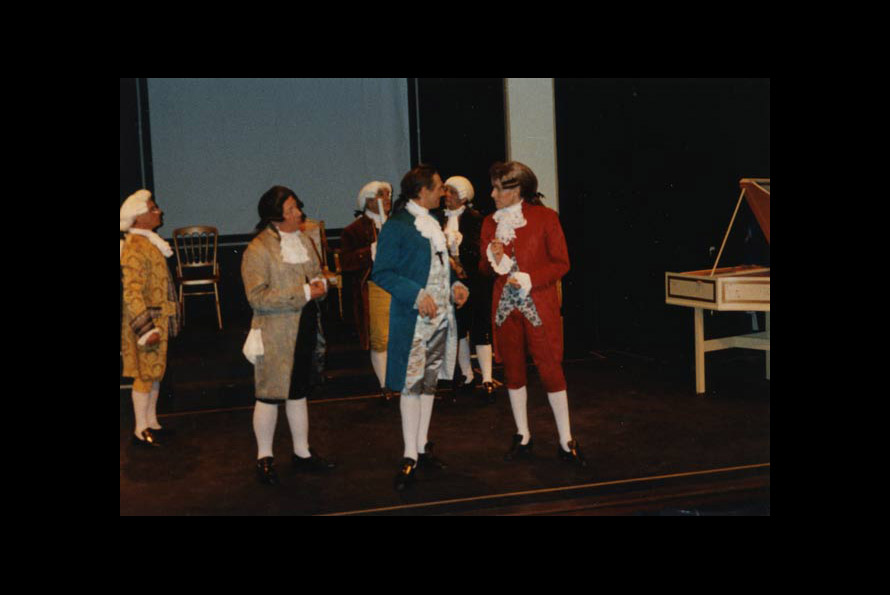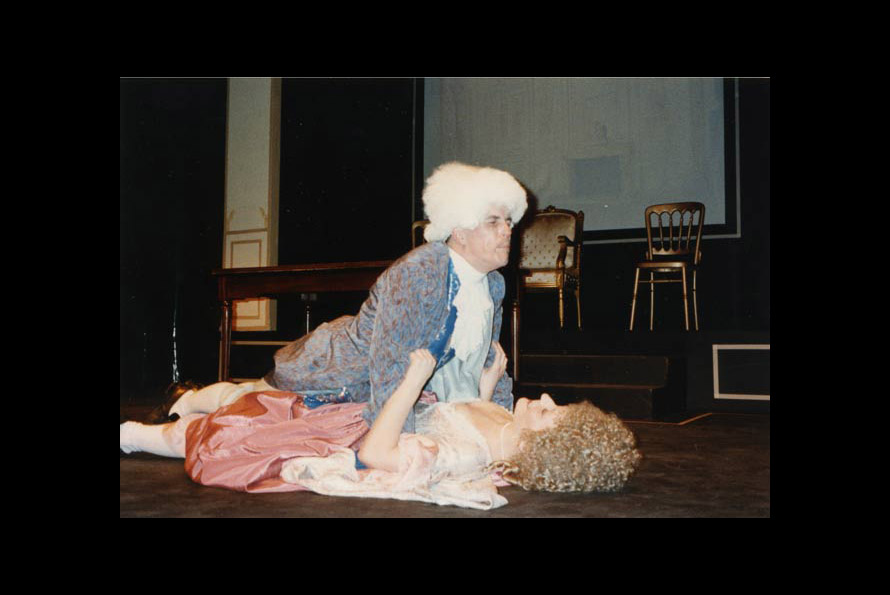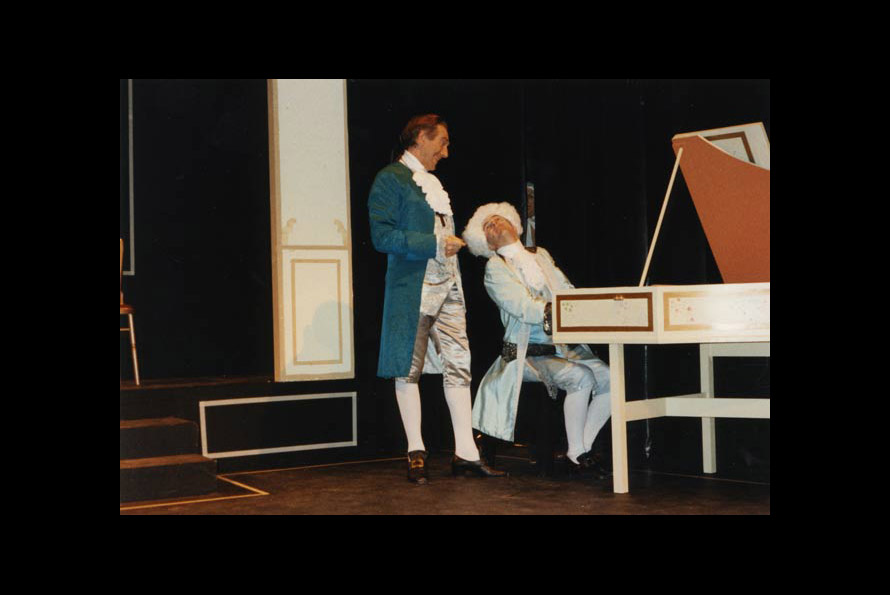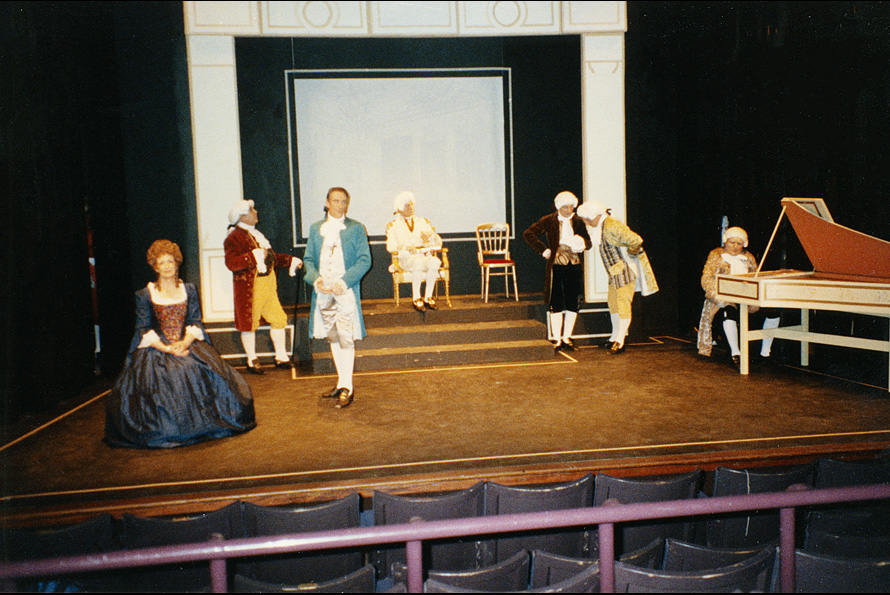Plaza Theatre, Romsey
on3rd to 7th March 1992
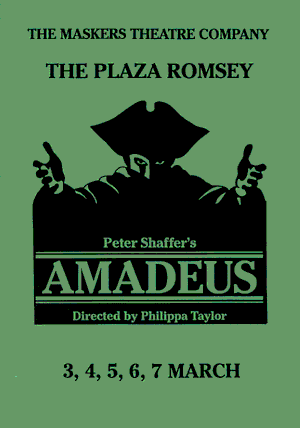
The Director, Philippa Taylor wrote:
The life of Wolfgang Amadous Mozart, the last ten years of which are covered in this play, has captured the imagination of generations of biographers and historians.
Born in Salzburg in 1756, he displayed, from the age of four, prodigious talents of performance and composition on the clavier. From his 6th to his 16th year, he Mas taken by his father on a series of ambitious and demanding concert tours through all the courts of Europe where he was feted by royalty. In Vienna he sat on the lap of the Empress Maria Theresa; in London he accompanied Queen Charlotte; at Versailles he dined constantly at the royal table; in Rome the Pope made him Chevalier of the Golden Spur.
This phenomenal early success was a mixed blessing. Although he was richly rewarded and came into close contact with influential composers, the rigours of 18th-century travel took a heavy toll of illness, which weakened him for the rest of his life.
The tours of his teenage years were less successful. He now found himself in the harshly competitive world of European music, where he failed again and again to secure a post. He settled very unwillingly in the service of the Prince-Archbishop of Salzburg. It was during this restless servitude that he composed some of his finest music - the piano and violin concertos, symphonies and the great masses.
After the resounding triumphs of his first great opera, "Idomeneo", in Munich, relations with his employer became even more strained, and in 1781 he found himself literally kicked out of his job to seek his fortune as a free-lance composer and performer in Vienna - where he was to spend the rest of his life.
The Vienna years were Mozart's most flourishing period of musical composition - including the six finest piano concertos, the string quartets and, of course, the five great operas. On the first night of "The Marriage of Figaro" every song was encored. His concerts became the toast of the town and he was in constant demand everywhere.
Yet in the midst of all this glory, the path to his downfall was being surely paved. He and his newly married wife, Constanze, lived way beyond their means and he ran into heavy debt. Even a triumph such as "Figaro", soon playing throughout Europe, earned him no more than the initial commission fee. He soon fell victim to the political intrigues, with which composers such as Salieri blocked his prospects of advancement at the court of Joseph II. His popularity with the fickle Viennese began to wane. "Don Giovanni", rapturously received in Prague, was treated very coolly in Vienna.
Forced to move into poorer lodgings, he began to decline in health. He was forced to spend much of the money he borrowed on sending Constanze to Baden to recover from the weakness of continual pregnancies. He was convinced that the mysterious grey-cloaked figure who came to him to commission a Requiem, was a premonition of his own death.
He wrote his last opera, the joyous and sublime "Magic Flute", for the music hall Theater Auf Dam Weiden in the suburbs of Vienna. It was a resounding success, and he was spared to see the first few performances. He collapsed and died - it is thought of kidney failure - in the early hours of 5th December 1791. He was still composing the Requiem as he lapsed into his final coma. He was thirty five years of age. Constanze survived him by 50 years.
The Southampton Evening Echo wrote:
Director Philippa Taylor waited a year before she cast Peter Shaffer's play, because she wanted to get the casting right. Her patience paid off with Jim Smith's Salieri, a man whose ambition is greater than his talent, and Mark Ponsford's arrogant, foul-mouthed Amadeus being perfect in this story of deadly rivalry. In the blink of an eye Jim Smith, who hardly ever left the stage, transformed from a 73-year-old wizened old man to a 31-year-old elegant member of a king's court. The final scenes when Salieri admits to the dying Mozart he has orchestrated his downfall, are gripping stuff as the two actors match each other move for move.
They are the two leading lights in a night which glowed with style. The Southampton-based company, in a flurry of opulent costumes and outrageous wigs, transported the audience to the musical circles of the 18th Century, where Salieri plotted to keep Mozart down and out. They are helped by a backdrop of slides of the salons of Vienna which supplement a sparse but fitting set.
Karen Upfield is skittish and yet steadfast and strong as Mozart's wife and Michael Patterson as the emperor and Bruce Atkinson, Albie Minns and Neville Green as his minions, were strong in support.
Sue Wilkinson, Southampton Evening Echo, 4th March 1992.
| Cast | |
| Wolfgang Amadeus Mozart | Mark Ponsford |
| Antomio Salieri | Jim Smith |
| Constanze Weber | Karen Upfield |
| Joseph II, Emperor of Austria | Michael Patterson |
| First Venticello | Robbie Carnegie |
| Second Venticello | David Bartlett |
| Count Johan Kilian Von Strack | Bruce Atkinson |
| Count Franz Orsini-Rosenberg | Albie Minns |
| Baron Gottfried Van Swieten | Neville Green |
| Kappelmeister Bonno | David Pike |
| Madame Teresa Salieri | Mollie Manns |
| Major Domo | Glenn Jenks |
| Katherina Cavalieri | Kate Atkinson |
| Salieri's Valet | Darrell Palmer |
| Salieri's Cook | Christine Baker |
| Servants/Citizens | Brenda Atkinson, Dawn Finbow, Daisy Morris, Glenn Jenks, Liz Rackham, Sarah Spencer |
| For the Maskers | |
| The Director | Philippa Taylor |
| Stage Manager | Belinda Drew |
| Assistant Stage Managers | Val Barwell, Kevin Mitchell |
| Music Consultant | Michael Patterson |
| Sound | Lawrie Gee |
| Sound Operators | Dave King, Graham Godfrey |
| Lighting Design | Ron Tillyer |
| Lighting Operator | Alison Mountford |
| Slide Operator | Val Oswald |
| Production Assistant | Pamela Simpson |
| Costume Co-ordinator | Christine Baker, Helen Officer |
| Properties | Ella Lockett, Jean Durman |
| Set Design | Ken Spencer |
| Set Building | Roger Lockett, Geoff Cook |
| Set Painting | Edwin Beechcroft, Ken Spencer |
| Marketing | Jan Ward |
| Publicity | Michael Patterson, Jan Ward |
| Front of House | Peter Scrivener |
| Photography | Clive Weeks |
And from the The Romsey Advertiser
............It is, indeed, a remarkable play; and this was a truly remarkable production; which fully deserved the long-lasting applause with which the final curtain was greeted.
Romsey Advertiser 14 March 1992
Read the whole review - click here
click on a photo to enlarge it
